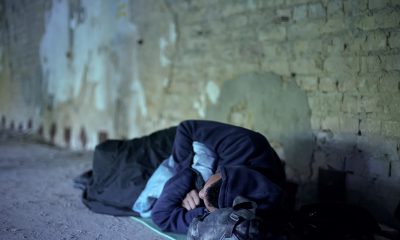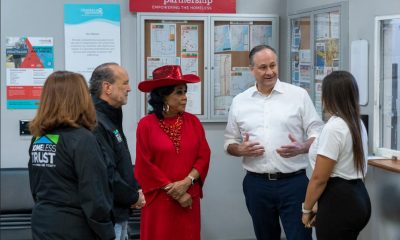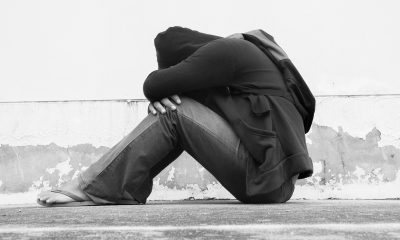National
LGBT youth included in plan to end homelessness
Housing secretary says programs will aid ‘ostracized and targeted’ teens

The Obama administration highlighted the longstanding problem of homelessness among LGBT youth this week when it announced a strategy that U.S. Housing & Urban Development Secretary Shaun Donavan called “the most far-reaching and ambitious plan to end homelessness in our history.”
Administration officials released the plan Tuesday during a White House event at which Donovan, two other cabinet secretaries and the head of the U.S. Interagency Council on Homelessness pledged to find stable housing for most of the nation’s homeless within 10 years.
Donavan, who serves as chair of the Interagency Council on Homelessness, said that many people who fall victim to homelessness face discrimination based on their sexual orientation and gender identity.
“What I would say is so many of those at risk of homelessness are marginalized in various ways,” he told the Blade after the event. “As we’ve seen with youth, those who age out of foster care … [and] who are ostracized and targeted because of their gender identity or sexual orientation are one of the populations that are at increased risk for homelessness.
“So everyone has a stake in making sure that those who are at risk of homelessness, including those targeted because of their gender identity and sexual orientation, need to be part of this effort, and they are.”
He said that curtailing bias against homeless LGBT youth would result in broader benefits for the country.
“It’s also wrong for taxpayers of the nation, more broadly, because ultimately the costs of homelessness to our society and the taxpayers are far larger when folks fall into homelessness than if we prevent that homelessness in advance,” he said.
The 67-page document released Tuesday, “Opening Doors: Federal Strategic Plan to Prevent & End Homelessness 2010,” calls for building on what it says have been highly effective strategies for addressing the homeless problem that local and state governments and private charitable groups in many parts of the country have used.
Among other things, it calls for eradicating homelessness among military veterans and the chronic homeless within five years. It calls for eliminating homelessness among “unaccompanied youth” and “individual adults” within 10 years.
“Youth often leave home as a result of severe family conflict which may include physical and/or sexual abuse,” says the plan. “Some studies suggest that racial and ethnic minority youth as well as youth who are gay, lesbian, bisexual, transgender, and questioning represent a larger proportion when compared to the overall population.”
The plan says that, in general, homeless youth need shelter along with transitional programs and services that emphasize “stabilization and reunification with families when appropriate.”
However, it notes that “in many cases, youth have become homeless because of hostile and dangerous conditions at home and that reunification with families may not be appropriate for groups such as victims of abuse and many gay, lesbian, bisexual and transgender youth.”
Donovan said the U.S. Interagency Council on Homelessness, which prepared the plan, consists of 19 federal agencies, including HUD and the U.S. departments of Health & Human Services and Veterans Affairs.
Barbara Poppe, the Council’s executive director and who is credited with coordinating the project, told the Blade that experts on LGBT youth and homelessness provided information to the Council through a special working group that focused on youth issues.
“We believe they should have absolute access to shelter and support,” she said of LGBT youth. “But more importantly, we want to set them on a path to employment and transition to adulthood. We’re very excited to implement the plan with a strong focus on any homelessness among youth over the next decade.”
The Obama administration’s plan for addressing homelessness comes four year after the National Gay & Lesbian Task Force and the National Coalition for the Homeless issued what many LGBT activists considered a groundbreaking report on homelessness among LGBT youth.
The report, based on an extensive review of research conducted by private and local governmental agencies throughout the country, said its findings suggest that between 20 percent and 40 percent of all homeless youth identity as LGBT.
Among other things, the report found that LGBT youth were often victims of violence and harassment in homeless shelter. The report also noted that faith-based shelters sometimes created further problems for LGBT youth because of certain religious teachings on homosexuality.
“Our country can do better, and its leadership has an obligation to ensure that all people — including LGBT youth and adults — are not left without fundamentals such as food, safety and a roof over one’s head,” said Task Force Executive Director Rea Carey in prepared comments on the administration’s new homelessness plan.
“While we are pleased to see that LGBT people are being considered in a strategy to confront homelessness, real progress will occur when such inclusive strategies are actually implemented,” she said. “Homelessness is a critical issue for the lesbian, gay, bisexual and transgender community. For far too long, too many of our young people have been kicked out of their homes, forced to live on the streets, for simply being who they are. This has been a national disgrace of epidemic proportions.”
U.S. Supreme Court
Concern over marriage equality in US grows two decades after first Mass. same-sex weddings
Gay and lesbian couples began to marry in Bay State in 2004

Two decades after Massachusetts became the first state to legalize same-sex marriage, a new study reveals both significant progress and ongoing challenges for married LGBTQ couples in the U.S., with a growing sense of insecurity about the future of their rights.
The Williams Institute at UCLA School of Law surveyed 484 married same-sex couples from all 50 states and D.C. The study, released Monday, marks the 20th anniversary of legal same-sex marriage in the U.S.
Researchers found that 93 percent of respondents cited love as a primary reason for marrying, with 75 percent also mentioning legal protections. Over 83 percent reported positive changes in their sense of security, and 74.6 percent noted improved life satisfaction since marrying.
However, the study also highlighted persistent discrimination and growing concerns about the future. About 11 percent of couples who had a wedding reported facing prejudice during the planning process.
Alarmingly, nearly 80 percent of respondents expressed concern about the potential overturning of the 2015 Obergefell v. Hodges decision, which legalized same-sex marriage nationwide. This anxiety has been exacerbated by initiatives like Project 2025, a conservative policy blueprint that some fear could roll back LGBTQ rights if implemented.
The possibility of a former President Donald Trump victory in the upcoming election has further intensified these concerns. Many respondents cited Trump’s previous U.S. Supreme Court appointments and his statements on LGBTQ issues as reasons for their apprehension. One participant stated, “The thought of another Trump presidency keeps me up at night. We’ve come so far, but it feels like our rights could be stripped away at any moment.”
The current political climate has 29 percent of respondents considering moving to another state, with 52.9 percent citing socio-political concerns as a primary reason. This reflects a growing sense of insecurity among LGBTQ couples about their rights and freedoms.
Brad Sears, founding executive director of the Williams Institute, noted, “The data clearly show that marriage equality has had a profound positive impact on same-sex couples and their families. However, it also reveals ongoing challenges and serious concerns about the future of these rights in light of current political trends and the upcoming election.”
Christy Mallory, legal director at the Williams Institute and lead author of the study, added, “This research provides crucial insights into the lived experiences of same-sex couples two decades after marriage equality began in the U.S. The high level of concern about potential loss of rights underscores the continued importance of legal protections and public support for LGBTQ+ equality.”
The study found that 30 percent of surveyed couples have children, with 58.1 percent of those parents reporting that marriage provided more stability for their families. However, many of these families now worry about the security of their legal status in the face of potential policy changes and shifting political landscapes.
As the nation reflects on two decades of marriage equality, the study underscores both the transformative power of legal recognition and the ongoing need for vigilance in protecting LGBTQ+ rights. The findings highlight the complex reality faced by same-sex couples in America today: Celebrating hard-won progress while grappling with uncertainty about the future, particularly in light of upcoming political events and potential shifts in leadership.
State Department
State Department hosts meeting on LGBTQ rights and foreign policy
Event took place before Pride Month reception

Secretary of State Antony Blinken on Thursday hosted a group of LGBTQ activists and politicians from around the world at the State Department.
The event — described as a “Convening on U.S. Foreign Policy: National Security, Inclusive Development, and the Human Rights of LGBTQI+ Persons” — took place before the State Department’s annual Pride Month reception. Participants included:
• Jessica Stern, the special U.S. envoy for the promotion of LGBTQ and intersex rights
• U.S. Ambassador to the U.N. Linda Thomas-Greenfield
• U.S. Trade Representative Katherine Tai
• U.S. Ambassador to India Eric Garcetti
• Suzanne Goldberg, senior advisor to the Under Secretary of State for Civil Security, Democracy, and Human Rights
• Under Secretary of State for Civilian Security, Democracy, and Human Rights Uzra Zeya
• U.S. Agency for International Development Senior LGBTQI+ Coordinator Jay Gilliam
• USAID Counselor Clinton D. White
• National Security Council Senior Director for Democracy and Human Rights Kelly Razzouk
• Assistant U.S. Secretary of Health Adm. Rachel Levine
• National Security Council Human Rights Director Jess Huber
• U.N. Assistant Secretary General for Human Rights Ilze Brandt Kehris
• Icelandic Ambassador to the U.S. Bergdís Ellertsdóttir
• Council for Global Equality Co-Executive Director Mark Bromley
• Outright International Senior Advisor for Global Intersex Rights Kimberly Zieselman
• Essy Adhiambo, executive director of the Institute for Equality and Non Discrimination in Kenya
• Pau González, co-chair of Hombres Trans Panamá and PFLAG-Panamá
“Forty-five years ago, thousands gathered in D.C. in what became the first national march for LGBTQI+, demanding their voices be heard,” said Thomas-Greenfield in a post to her X account that showed her speaking at the event. “We must continue to carry forward the spirit of these pioneers and fight for equal rights and dignity for all.”
Forty-five years ago, thousands gathered in DC in what became the first national march for LGBTQI+, demanding their voices be heard.
We must continue to carry forward the spirit of these pioneers and fight for equal rights and dignity for all. 🏳️🌈🏳️⚧️ pic.twitter.com/oph2Ahmfhq
— Ambassador Linda Thomas-Greenfield (@USAmbUN) June 28, 2024
President Joe Biden in 2021 signed a memo that committed the U.S. to promoting LGBTQ and intersex rights abroad as part of his administration’s overall foreign policy.
“LGBTQI+ rights are human rights,” said Blinken. “Our government has a responsibility to defend them, to promote them — here and everywhere.”
Blinken noted consensual same-sex sexual relations remain criminalized in 64 countries, with the death penalty in 11 of them.
He specifically highlighted Uganda’s Anti-Homosexuality Act and Hungarian Prime Minister Viktor Orbán’s government’s “smearing scapegoating, stigmatizing LGBTQI+ persons — vilifying them with degrading labels, denying them equal rights, normalizing violence against them.” (Gay U.S. Ambassador to Hungary David Pressman this month marched in the annual Budapest Pride parade.)
Blinken noted Iraqi MPs earlier this year “passed legislation that punishes same-sex relations with up to 15 years in prison.” He also pointed out that Indonesian lawmakers approved a new criminal code banning extramarital sex.
“In a nation where same-sex couples cannot marry, these laws effectively make all same-sex conduct illegal and they undermine privacy for all Indonesians,” said Blinken.
“We’re defending and promoting LGBTQI+ rights around the world,” he said.
Blinken noted seven countries — Barbados, St. Kitts and Nevis, Antigua and Barbuda, Dominica, Namibia, Singapore, the Cook Islands — have decriminalized consensual same-sex sexual relations over the last two years. He also highlighted Greece, Liechtenstein, and Thailand this year extended marriage rights to same-sex couples, and other countries are banning so-called “conversion therapy.”
“These achievements are possible because of incredibly courageous human rights defenders and government partners on the ground, but I believe America’s support is indispensable,” said Blinken. “When we engage — sometimes publicly, sometimes privately, sometimes both — when we share our own knowledge and experience, we can and we do achieve change.”
Blinken also announced the U.S. now considers sexual orientation and gender identity are part of the International Covenant on Civil and Political Rights that took effect in 1976.
“This is one of the key treaties committing nations to upholding universal rights,” he said.
“In our regular reporting to the council on human rights, we will continue to include incidents of discrimination or abuse committed against LGBTQI+ persons, now with the clear framework of this well-supported interpretation,” added Blinken. “That will further empower our efforts.”
Blinken reiterated this point and the Biden-Harris administration’s commitment to the promotion of LGBTQ and intersex rights abroad when he spoke at the State Department’s Pride Month event.
“Defending, promoting LGBTQI+ rights globally is the right thing to do, but beyond that, it’s the smart and necessary thing to do for our country, for our national security, for our well-being,” he said.
The White House
Jill and Ashley Biden headline White House Pride celebration
First lady celebrated historic pardons of LGBTQ veterans

First lady Jill Biden and the president and first lady’s daughter, Ashley Biden, headlined the White House Pride celebration on the South Lawn on Wednesday, followed by a performance by singer and actress Deborah Cox.
“My dad has built the most pro-equality administration” in history, Ashley Biden said, crediting the work of LGBTQ people of color like Marsha P. Johnson, a prominent figure in the Stonewall uprising of 1969, as well as “so many of you [who] have continued to lead their fearless fighting against against injustice here and around the world.”
She introduced her mother as “the woman who taught me to be myself up showed me in so many ways how I can make a difference” and who “works every single day, tirelessly, to ensure that all people have the opportunities and freedoms that they deserve.”
“I hope that all of you feel that freedom and love on the South Lawn today,” Jill Biden said.
Her remarks were briefly interrupted by a protestor’s chants of “no Pride in genocide,” which was drowned out by chants of “four more years.”
The first lady noted how many of the attendees came “here from states that are passing laws targeting LGBTQ Americans.”
“There are those who see our communities and our families and wish to tear them down,” she said, “those who can’t see that the world is so much bigger and [more] beautiful than they know — but when our homes are threatened, when they strip away our rights, and deny our basic humanity, we say, ‘not on our watch.'”
“Pride is a celebration, but it is also a declaration,” the first lady said, highlighting the U.S. Supreme Court’s ruling in Obergefell v. Hodges nine years ago, which established marriage equality as the law of the land.
She then credited the accomplishments of the Biden-Harris administration on matters of LGBTQ rights, including the repeal of the previous administration’s ban on military service by transgender servicemembers and the FDA’s loosening of restrictions on blood donation by gay and bisexual men.
The first lady also celebrated the president’s announcement earlier on Wednesday that he will pardon LGBTQ veterans who were discharged and court martialed because of their sexual orientation or gender identity.
“We will never stop fighting for this community,” she said.

-

 Canada1 day ago
Canada1 day agoToronto Pride parade cancelled after pro-Palestinian protesters disrupt it
-

 Theater5 days ago
Theater5 days agoStephen Mark Lukas makes sublime turn in ‘Funny Girl’
-

 Baltimore3 days ago
Baltimore3 days agoDespite record crowds, Baltimore Pride’s LGBTQ critics say organizers dropped the ball
-

 Sports4 days ago
Sports4 days agoHaters troll official Olympics Instagram for celebrating gay athlete and boyfriend











